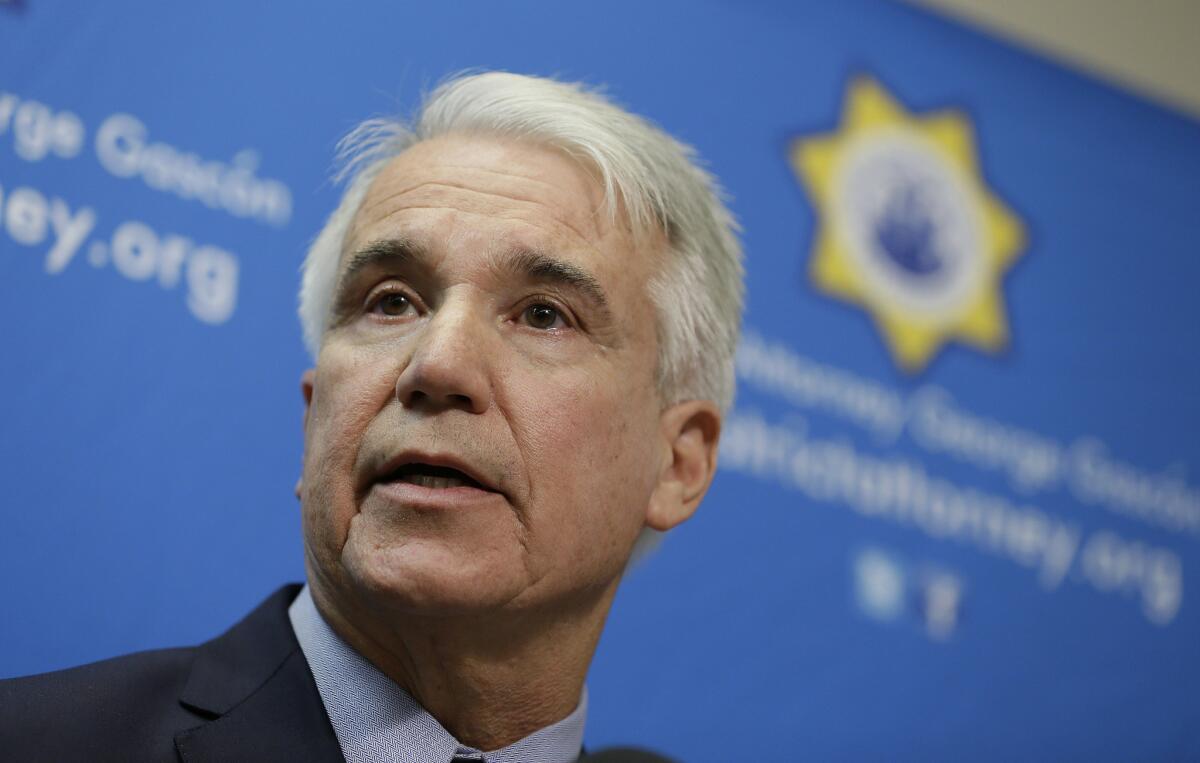Californians make an unmistakable commitment to criminal justice reform

- Share via
Asked whether to step back following nine years of criminal justice reform, Californians on Tuesday instead took a long stride forward, rejecting stiffer punishments, restoring parolees’ voting rights and, in Los Angeles County — the state’s largest local jurisdiction — enacting a bold program to fund health-based alternatives to criminal sanctions and electing a new district attorney who campaigned on a promise to bring more equity and balance to criminal prosecutions.
The vote here will have ramifications nationwide, perhaps encouraging other states to embrace reforms and follow California’s lead — much as they did beginning in the 1970s when this state lurched in the other direction, adopting stiffer penalties and launching a tough-on-crime trend that petered out only when unconstitutionally overcrowded prisons and a dire budget shortfall allowed long-contemplated sentencing reforms to move forward in 2011.
George Gascón, in defeating L.A. County Dist. Atty. Jackie Lacey, instantly becomes the face of the progressive prosecutor movement, taking over an office that dwarfs Cook County (Chicago), Philadelphia and other jurisdictions that over the last several years rejected old measures of prosecutorial success such as the number of convictions and length of prison sentences.
Given Gascón’s background and his law enforcement journey, his likely win is even more noteworthy for coming in a year of backlash against police violence and renewed attention on the disproportionate number of killings of Black people by police. A police officer in L.A., a police chief in two other cities and district attorney in San Francisco, Gascón leaned on that experience to critique traditional policing and prosecutorial approaches that exacerbated rather that corrected the societal inequities that undermine public safety.
Gascón will replace Lacey, who was not the retrograde tough-on-crime, easy-on-cops prosecutor depicted by many of her critics, but also did not move as far or as fast as she could have in directing the nation’s largest prosecutorial office away from old-school tough-on-crime policies.
In approving Measure J, L.A. voters also made their county a leading jurisdiction in the nationwide conversation over whether to shift resources from police and jail to treatment, housing and other services that could assist people in crisis and deflect them from unnecessary criminalization. The budget measure sets a county spending floor for social services. It emerged after an intense but thoughtful and productive months-long process to create alternatives to incarceration. It stands as a counterpoint to the poorly vetted “defund the police” budget cuts considered in other cities in the aftermath of the killing of George Floyd by Minneapolis police in May. If implementation is handled properly, Measure J could become a better, more thoughtful and more successful model for other cities and counties to duplicate.
Statewide, voters saw through the misleading pitches for Proposition 20, the capstone of a decade-long campaign of fear-mongering waged by police, prison guards and others nostalgic for the disastrous excessive-sentencing policies of the past. In rejecting the measure to roll back several important criminal justice reforms, voters in effect said “yes” to laws that have reduced the state’s unnecessarily (and dangerously) overcrowded prison population, and to ballot measures from recent years that downgraded excessive punishments for petty offenses and provided inmates incentives to seek out rehabilitation programs. And they said “no” to a long string of falsehoods about reforms and their alleged but disproven links to violent crime.
Proposition 17 restores the right of parolees to vote and helps reintegrate them into a free and responsible society after they come home from prison.
The only thing that makes the night’s results a mixed bag for criminal justice reform was the defeat of Proposition 25, which would have swept away money bail. The vote keeps the bail bond industry in business in California, and unjustly continues to make suspects’ wealth or poverty key factors in determining whether they will be kept in jail before trial. This approach to pretrial detention makes a mockery of the presumption of innocence.
The silver lining is the thought that the defeat was not actually a vote for money bail but a vote by at least some Californians for even more far-reaching pretrial reform. Proposition 25 had drawn opposition not just from the bail industry, but also from some criminal justice reformers who argued that the measure would cause too many suspects to be held on the basis of algorithms that show them, wrongly and discriminatorily, to be too risky to release. These critics also believe they can do better for pretrial justice in court challenges or with alternative legislation. Let’s hope so. It would be tragic to allow an unattainable perfect reform to defeat an achievable good one.
Californians’ unmistakable commitment to criminal justice reform comes amid a time of unrest and unease in the nation, exacerbated by President Trump’s attempts to characterize opposition to police practices as threats to public safety. A contentious debate over crime, policing, prosecution and punishment shows little sign of abating. But Californians, by their votes, weighed in on the side of justice and equity, and presented a strong argument against the fear-based, and racially discriminatory, practices of our recent past.
More to Read
A cure for the common opinion
Get thought-provoking perspectives with our weekly newsletter.
You may occasionally receive promotional content from the Los Angeles Times.






